
Woodrow Wilson Guthrie was an American singer-songwriter and composer who was one of the most significant figures in American folk music. His work focused on themes of American socialism and anti-fascism. He inspired several generations both politically and musically with songs such as "This Land Is Your Land".
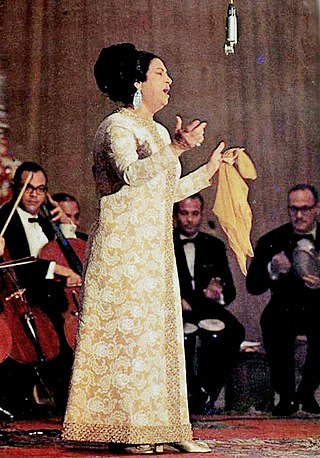
Umm Kulthum was an Egyptian singer, songwriter, and film actress active from the 1920s to the 1970s. She was given the honorific title Kawkab el-Sharq. Immensely popular throughout the Arab World, Kulthum is a national icon in her native Egypt; she has been dubbed "The Voice of Egypt" and "Egypt's Fourth Pyramid". In 2023, Rolling Stone ranked Kulthum at number 61 on its list of the 200 Greatest Singers of All Time.

Victor August Herbert was an American composer, cellist and conductor of English and Irish ancestry and German training. Although Herbert enjoyed important careers as a cello soloist and conductor, he is best known for composing many successful operettas that premiered on Broadway from the 1890s to World War I. He was also prominent among the Tin Pan Alley composers and was later a founder of the American Society of Composers, Authors, and Publishers (ASCAP). A prolific composer, Herbert produced two operas, a cantata, 43 operettas, incidental music to 10 plays, 31 compositions for orchestra, nine band compositions, nine cello compositions, five violin compositions with piano or orchestra, 22 piano compositions and numerous songs, choral compositions and orchestrations of works by other composers, among other music.
The music of Uzbekistan has reflected the diverse influences that have shaped the country. It is very similar to the music of the Middle East and is characterized by complicated rhythms and meters. Because of the long history of music in the country and the large variety of music styles and musical instruments, Uzbekistan is often regarded as one of the most musically diverse countries in Central Asia.
The music of Israel is a combination of Jewish and non-Jewish music traditions that have come together over the course of a century to create a distinctive musical culture. For almost 150 years, musicians have sought original stylistic elements that would define the emerging national spirit. In addition to creating an Israeli style and sound, Israel's musicians have made significant contributions to classical, jazz, pop rock and other international music genres. Since the 1970s, there has been a flowering of musical diversity, with Israeli rock, folk and jazz musicians creating and performing extensively, both locally and abroad. Many of the world's top classical musicians are Israelis or Israeli expatriates. The works of Israeli classical composers have been performed by leading orchestras worldwide.
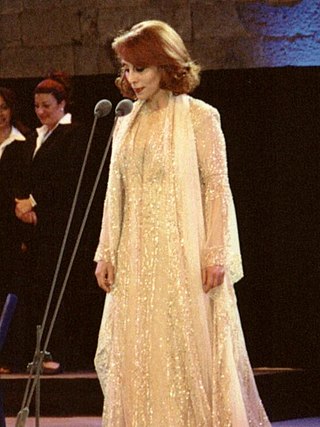
Nouhad Wadie Haddad, known as Fairuz, is a Lebanese singer. She is widely considered an iconic vocalist and one of the most celebrated singers in the history of the Arab world. She is popularly known as "The Bird of The East", "The Cedar of Lebanon", "The Moon's Neighbor", and "The Voice of Lebanon", among others.
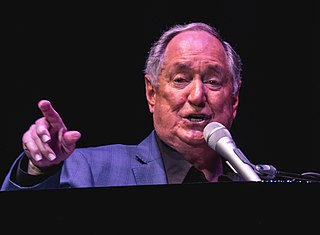
Neil Sedaka is an American singer, songwriter and pianist. Since his music career began in 1957, he has sold millions of records worldwide and has written or co-written over 500 songs for himself and other artists, collaborating mostly with lyricists Howard "Howie" Greenfield and Phil Cody.
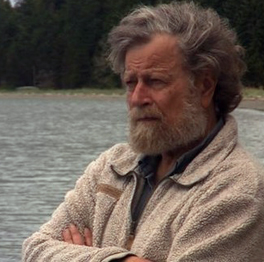
Morten Johannes Lauridsen is an American composer and academic teacher. A National Medal of Arts recipient (2007), he was composer-in-residence of the Los Angeles Master Chorale from 1994 to 2001, and is the distinguished professor emeritus of composition at the University of Southern California Thornton School of Music, where he taught for fifty-two years until his retirement in 2019.

Harvey John Andrews is an English singer-songwriter and poet. Andrews has produced 16 albums singing his own songs, many of which have also been recorded by other artists.

Fran Landesman was an American lyricist and poet. She grew up in New York City and lived for years in St. Louis, Missouri, where her husband Jay Landesman operated the Crystal Palace nightclub. One of her best-known songs is "Spring Can Really Hang You up the Most".

Sherali Joʻrayev was an Uzbek singer, songwriter, poet, author, and actor. He was an influential figure in Uzbek cultural life for nearly five decades. Much of his most celebrated work dates from the 1980s and 1990s.

Farhad Darya is an Afghan singer, composer, music producer, and philanthropist. Active since the 1980s, Darya has been one of the most renowned and influential Afghan pop musicians of the modern era, contributing to establishing new wave in Afghanistan and blending urban and rural styles. Darya's career has spanned multiple genres - including semi-classical ghazal, pop, folk, and rock - as well as both his native languages Dari Persian and Pashto as well as Uzbek, Hindi and English.

"On the Banks of the Wabash, Far Away" was among the best-selling songs of the 19th century, earning over $100,000 from sheet-music revenues. Written and composed by American songwriter Paul Dresser, it was published by the Tin Pan Alley firm of Howley, Haviland and Company in October 1897. The lyrics of the ballad reminisce about life near Dresser's childhood home by the Wabash River in Indiana, United States. The song remained popular for decades, and the Indiana General Assembly adopted it as the official state song on March 14, 1913. The song was the basis for a 1923 film of the same title. Its longtime popularity led to the emergence of several lyrical versions, including an 1898 anti-war song and a Swedish version that was a number-one hit.
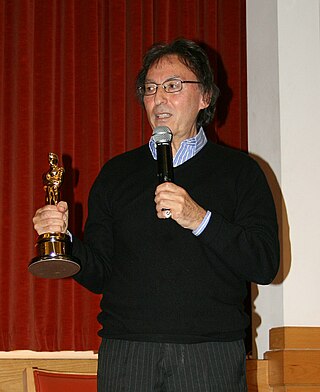
Donald Blackstone, known professionally as Don Black, is an English lyricist. His works have included numerous musicals, movie, television themes and hit songs. He has provided lyrics for John Barry, Charles Strouse, Matt Monro, Andrew Lloyd Webber, Quincy Jones, Hoyt Curtin, Lulu, Jule Styne, Henry Mancini, Meat Loaf, Michael Jackson, Elmer Bernstein, Michel Legrand, Hayley Westenra, A. R. Rahman, Marvin Hamlisch and Debbie Wiseman.
Michael Head, FRAM was a British composer, pianist, organist and singer who left some enduring works still popular today. He was noted for his association with the Royal Academy of Music. His compositional oeuvre mainly consists of songs, as well as choral works and few larger-scale pieces such as a piano concerto.
Alphons Joseph is an Indian music director and playback singer who works in Malayalam film industry. He debuted with 2003 movie Vellithira. Alphons is also noted for singing "Aaromale" from the film Vinnaithaandi Varuvaayaa, which was composed by A. R. Rahman.

Phạm Duy was one of Vietnam's most prolific songwriters with a musical career that spanned more than seven decades through some of the most turbulent periods of Vietnamese history and with more than one thousand songs to his credit, he is widely considered one of the three most salient and influential figures of modern Vietnamese music, along with Văn Cao and Trịnh Công Sơn. His music is noted for combining elements of traditional music with new methods, creating melodies that are both modern and traditional. A politically polarizing figure, his entire body of work was banned in North Vietnam during the Vietnam War and subsequently in unified Vietnam for more than 30 years until the government began to ease restrictions on some of his work upon his repatriation in 2005.

Bolalar are an Uzbek pop-rock band formed in 1989 by Tohir Sodiqov, Bahodir Poʻlatov, Javohir Zokirov, and Ruslan Sharipov. The band currently consists of members Tohir Sodiqov, Timur Gaynutdinov, Baxtiyor Nurmatov, Tofik Morduxayev (drums), and Vagif Zokirov. The name of the band, "Bolalar," means "children" or "boys" in Uzbek. It also means "guys" in Uzbek slang.

Rodrigo Fomins better known by the stage name Igo is a Latvian singer, poet and composer of rock and other music styles.
Lazgi is a folk music and dance of Khorezm. It has different styles for men and women.














